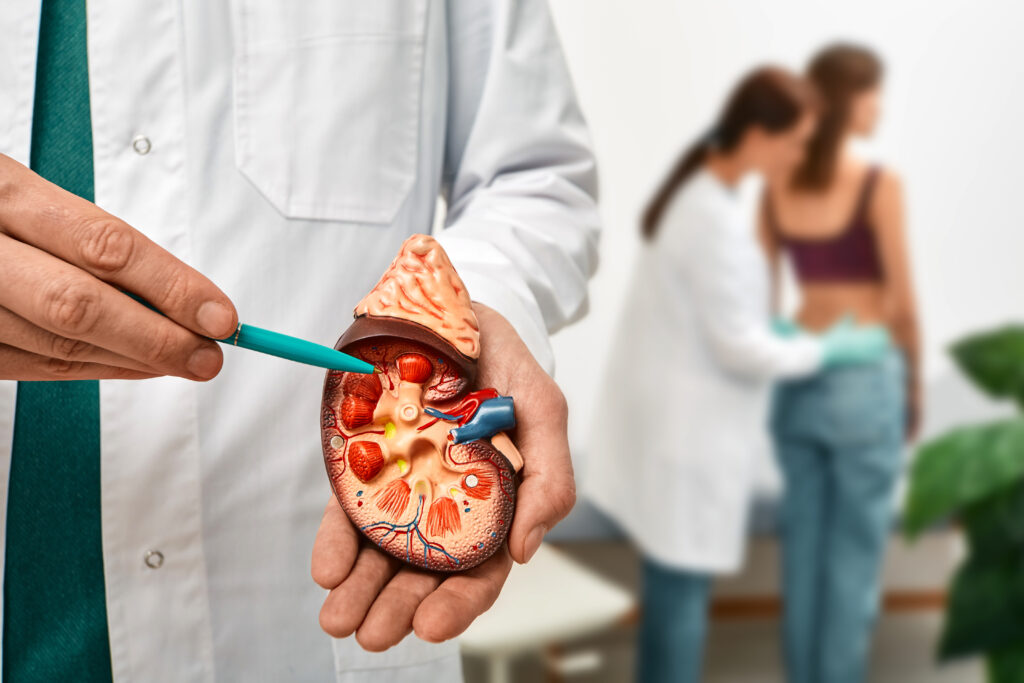
Anyone who has experienced a kidney stone understands the frustration of waiting for it to pass. Kidney stones are solid deposits that form when crystalizing substances in the urine are too high or are not properly absorbed by the kidneys. These stones don't always have symptoms, but those that do can bring intense pain in their wake.
Smaller stones are commonly flushed out of the body without medical assistance, yet large or extremely painful stones may require extra intervention. While kidney stones are not always avoidable, there are lifestyle choices that can help you lower your risk. What are the symptoms of kidney stones? How are they diagnosed and treated? And how can you reduce your chances of developing them?
Symptoms of Kidney Stones
Kidney stones tend not to cause symptoms early on, but they become more troublesome once they move within the body. Stones may enter a ureter, a tube that links the kidney to the bladder, and cause a blockage of urine flow, spasms, and swelling. The symptoms that accompany kidney stones may include:
- Severe back/side pain (often coming in waves)
- Groin pain
- Urgency to urinate and painful/burning urination
- Abnormally colored or foul-smelling urine
- Blood in the urine
- Persistent nausea
- Signs of infection (including fever, chills, and severe fatigue)
Risk Factors for Kidney Stones
There are several types of kidney stones, each of which can be attributed to different risk factors. These include:
- Calcium oxalate: Representing 80% of all kidney stones, these are incredibly common. They occur when the calcium content of the urine is too high. A diet that is too high in oxalate may contribute to these stones.
- Uric acid: Formed by high uric acid levels, these kidney stones commonly affect those who are overweight, ingesting too much salt and sugar, or have diabetes, gout, or IBS. Certain medications and chemotherapy can also pose a risk.
- Struvite: These uncommon stones affect those who experience chronic UTIs. Individuals with bladder tubes or difficulty with urination (such as those with neurological conditions) are more prone to developing struvite kidney stones.
- Cystine: These incredibly rare stones occur when the kidneys fail to absorb cystine (an amino acid) from the urine. This is an inherited genetic condition.
Diagnosing Kidney Stones
A diagnosis of kidney stones may emerge after symptoms begin, though asymptomatic stones may be found during unrelated testing. If your healthcare provider suspects kidney stones, they may use a CT scan or x-ray to determine their exact placement and size. A kidney-ureter-bladder x-ray (or "KUB" x-ray) can be employed to determine your eligibility for non-invasive or surgical treatment.
Your doctor may also assess your general kidney function. Blood and urine testing can help provide a full picture of your kidneys' health. Your provider may request that you filter your urine to catch any stones that pass. From there, they can test for the type of stone and determine how to lower your ongoing risk.
How Are Kidney Stones Treated?
The treatment for your kidney stones should depend on the severity of your symptoms, type of stone, and size/placement. For small, moderately painful stones, you will be asked to self-treat and wait for them to pass. This can take anywhere from one to three weeks. You should drink plenty of fluids and use over-the-counter medication to manage the pain.
Several minimally invasive procedures can help speed up the passing process. Your healthcare provider may prescribe medications to break down the stone or relax the ureter. One unique treatment is shock wave lithotripsy, which relies on sound waves to split the stones into smaller fragments. Another is a ureteroscopy, which employs a laser to grind down stones in the lower urinary tract.
Those with large stones and/or in severe pain may require hospitalization. Surgery becomes necessary if stones are trapped or risk infection/kidney damage. If you are self-treating kidney stones, notify your healthcare provider if your symptoms worsen. They will determine if you need to seek further intervention.
Preventing Kidney Stones
The prevention of kidney stones often comes down to lifestyle choices that are kinder to your kidneys. One of the primary ways to lower your risk is to stay hydrated. You should drink at least 64 ounces of water throughout the day. This will help you urinate regularly, flushing out the material that creates kidney stones.
You should also aim to eat a balanced, diverse diet. Diets rich in fruits, vegetables, proteins, and healthy fats can help lessen your chances of developing kidney stones. If kidney stones are a concern due to weight or diet, you should plan to limit your sodium intake and talk to your provider about a healthy weight-loss regimen. A dietitian may be able to help you develop a more kidney-friendly diet.
Generally, those who are chronically dehydrated, poorly nourished, or living with kidney/bladder-impacting conditions are at a higher risk of developing kidney stones. To avoid them, staying hydrated, following a healthy diet, and maintaining your treatment plan for co-existing medical conditions is important.
Resource Links
"Kidney Stones" via Mayo Clinic
"What are Kidney Stones?" via the Urology Care Foundation
"Kidney Stones" via Penn Medicine
"Kidney Stones" via Cleveland Clinic
"Kidney Stones" via the National Kidney Foundation
"Kidney Stones" via MedlinePlus





